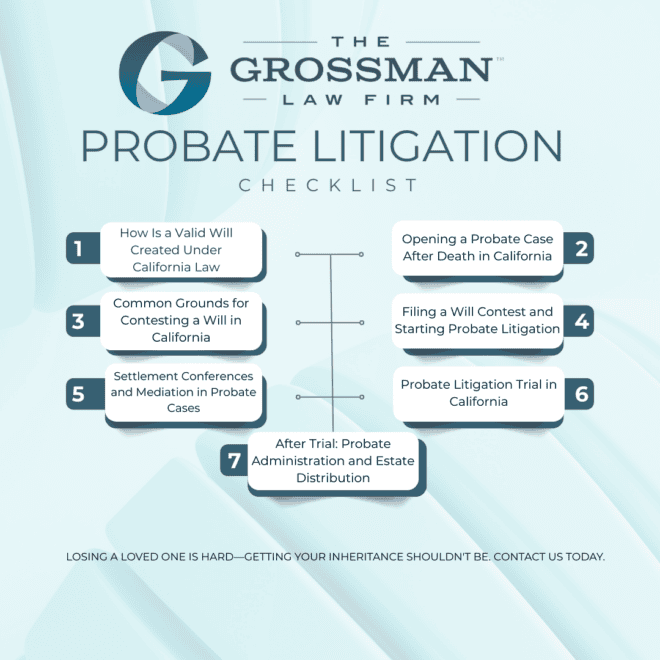California Probate Litigation Guide: From Will Creation to Final Resolution
What is Probate Litigation?
Probate litigation is a legal action taken by an heir or beneficiary against an executor, administrator, or a third party. It is essential for addressing disputes that arise in the probate process. It occurs when there is distrust between the executor or administrator. This distrust may be due to misconduct, failure to act, or lack of communication. All three are signs it may be time to start looking into probate litigation. But how does one start probate litigation?
Many people, when they learn their loved one has died, will turn to the executor and request a copy of the will. It seems simple enough, but often, you might find yourself in a situation where this doesn’t happen, and litigation becomes the next step. Some of those problems might be:
- Probate litigation should start if the executor doesn’t respond or refuses to provide a copy of the will.
- When the executor or administrator has been administering the probate estate for a year or longer and refuses to account or promises to account but fails to do so. If this happens, then it’s time to start probate litigation.
We recognize that probate litigation can be overwhelming, which is why we have developed this guide to help you navigate every step of the process. At The Grossman Law Firm, we are dedicated to ensuring our clients are well informed and empowered from will creation to final resolution. Count on us to lead you confidently through this journey.

California Probate Litigation Guide: From Will Creation to Final Resolution
1. How Is a Valid Will Created Under California Law
The first step in probate litigation is validating the will. In California, a valid last will must meet the following legal requirements:
- The testator (person making the will) must be at least 18 years old and have mental capacity (Probate Code § 6100.5).
- The will must be signed by the testator and two independent witnesses (Probate Code § 6110).
- Wills can be typed or holographic (handwritten).
Tip: Storing the original will securely is crucial for avoiding probate litigation later.
2. Opening a Probate Case After Death in California
After the testator’s death, the probate process begins:
- Locate the original will immediately.
- File a Petition for Probate in the county Superior Court where the decedent lived (Probate Code § 8000).
- Attend the initial probate hearing and notify heirs and beneficiaries as required by law.
If there is no will (intestate estate), the court appoints an administrator under California intestacy laws.
Learn more: How to Start Probate in California
3. Common Grounds for Contesting a Will in California
California law allows beneficiaries or interested parties to contest a will based on the following:
- Lack of Mental Capacity (Probate Code §§ 810–813, § 6100.5)
- Undue Influence (Probate Code § 86)
- Fraud or Forgery (Probate Code § 6111.5)
- Improper Execution
- Mistake
Deadline:
If you wish to contest a will, you must do so before or during the first probate hearing. If you miss this initial opportunity in California, you may still have 120 days after the will has been admitted to probate to challenge it. To successfully contest the will, you must provide valid grounds that pertain to its legality rather than just personal disagreements with how the assets are distributed.
Explore in detail: Grounds for Will Contests in California
4. Filing a Will Contest and Starting Probate Litigation
The probate litigation process officially starts when an Objection to Probate is filed. The steps include:
- Filing a formal objection and serving it properly.
- Engaging in discovery:
- Taking depositions of witnesses and the drafting attorney.
- Requesting medical and financial records.
- Investigating allegations of undue influence or incapacity.
Important Tip: Discovery often reveals whether the will contest has strong evidence for settlement or trial.
5. Settlement Conferences and Mediation in Probate Cases
Most California probate courts will require a Mandatory Settlement Conference (MSC) or private mediation before trial.
- Settlements can modify how assets are distributed.
- Mediation saves time, emotional energy, and costs compared to a trial.
6. Probate Litigation Trial in California
If settlement fails, the case proceeds to a bench trial (trial before a judge):
- The proponent, the party who offers the will for probate, must prove that the will was executed correctly.
- The contestant must prove undue influence, lack of capacity, fraud, or other challenges.
- Evidence includes testimony, documents, and expert witnesses (e.g., medical experts).
Outcome:
The judge decides whether to admit or reject the will and, if applicable, can also rule on related trust disputes.
7. After Trial: Probate Administration and Estate Distribution
Once litigation ends:
- The estate pays debts, taxes, and administrative costs.
- The remaining assets are distributed according to the valid will, trust, or intestate succession laws.
- A final accounting is submitted to the court for approval.
- The executor or administrator files for final discharge and closes the probate case.
Learn more: What happens after Probate Litigation
Probate Litigation: Next Steps
Although probate litigation can be intense and complicated, it doesn’t have to be overwhelming. With the proper guidance, litigation can go from complex to manageable. An experienced probate attorney can make all the difference by providing knowledgeable legal support and navigating you through the intricacies of the probate process more smoothly.
For more information on probate litigation, explore our resource, “Probate Litigation: A Comprehensive Guide for Heirs and Beneficiaries,” available on our website for an in-depth look at the probate litigation process. If you would like an honest evaluation of your case, please fill out our Get Help Now form. You can also contact our office to schedule your free 30-minute phone consultation by calling us at (888) 443-6590.